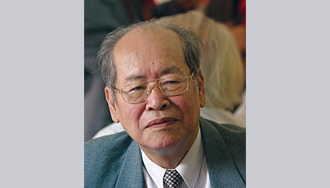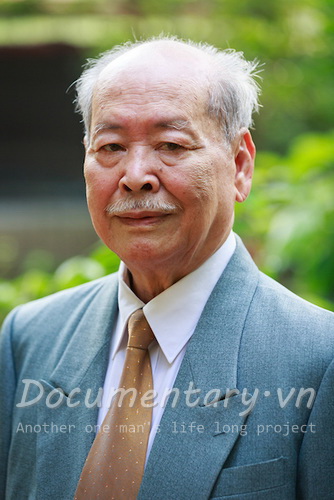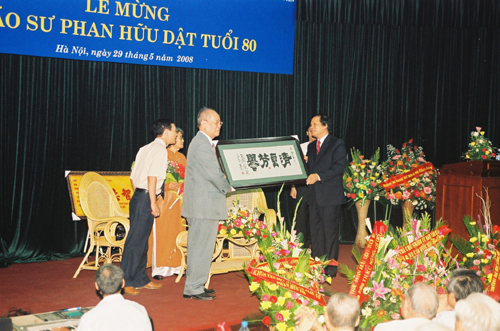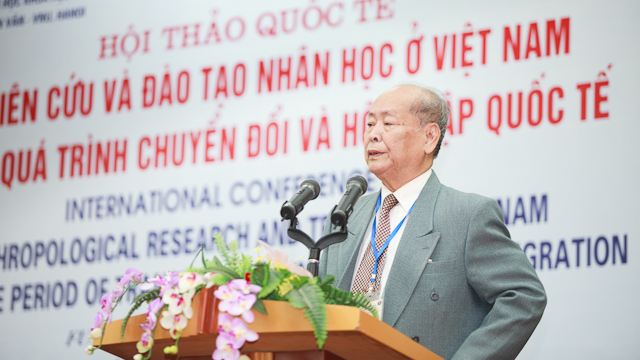
In 1954, he was sent to study at Hanoi University of Letters. It was Professor Tran Van Giau who advised him to study Ethnology, and Ethnology became his career from then on. After graduating from university with honors, he was transferred to do postgraduate research with the topic: “M-speaking peoplesKhmer in Northern Vietnam”. The thesis was defended in 1963 at Lomonosov State University. This was the first doctoral thesis in Ethnology by a Vietnamese graduate student to be defended abroad under the democratic republic regime.
On his journey of Ethnology, his footprints have been present in many lands of the country, from Lung Cu (Ha Giang) to Xom Mui (Ca Mau). As his student over 30 years ago, I was fortunate to hear him tell many field memories about many ethnic groups with many unforgettable flavors and memories, from the thang co and men men dishes of the Hmong people in the Dong Van plateau to the echoes of the bronze drums of the Lo Lo people on the top of Lung Cu, from the taste of sour bamboo shoots cooked with frogs, a specialty of the Muong people in the Northwest region to the porridge dish of the Duc people in the Truong Son region, about the fragrant chicken porridge pot in Chom Lom village in the Western region of Quang Binh that still had the whole intestines unprocessed... He told about the time he met Uncle Ho and his question about Xa la Vang, an unforgettable memory that gave him strength on his research path.

Prof. Dr. People's Teacher Phan Huu Dat - leading scientist in Anthropology,
Head of the Department of History (1970-1975), Rector of Hanoi University of Science (1985-1988)/Photo: Thanh Long
Over half a century of teaching and scientific research, Professor Phan Huu Dat has become one of the leading professors in Anthropology. His research works focus on the following contents: Theoretical issues on ethnicity, national community and Anthropological theory; Culture of ethnic groups in Vietnam, Culture and development; Ethnic processes and ethnic relations in Vietnam, Southeast Asia and the world; Ethnology and ethnic policies of our Party and State in the light of Ho Chi Minh's thought; History of marriage and family.
Over 100 published research works of Professor Phan Huu Dat have addressed core issues in Ethnological research, from theoretical issues in research to summarizing research issues in Ethnology in our country; from Vietnamese Ethnology to ethnological issues in the world; from culture and development to the requirements of training and researching Ethnology to serve the planning and implementation of ethnic policies and guidelines of the Party and State; from ethnic relations and urgent issues in our country and in the world to ethnic issues in globalization; from promoting research in social sciences and humanities to applied research...His research works, in any field, always ensure theoretical depth, ideological principles, and practical significance in terms of application..
As one of the leading Ethnologists, his research issues laid the foundation for the development of Vietnamese Ethnology. He was the first Vietnamese to compile textbooks.Ethnological basis(1973) for research and teaching. In the 90s of the 20th century, many of his research works continued to address the requirements of Ethnological research in the direction ofAnthropologyon the basis of research achievements and new perceptions of the country's development requirements, regional and international integration.

Prof. Dr. People's Teacher Phan Huu Dat at his 80th birthday celebration in 2008
Based on basic research, the scientific research works of Professor Phan Huu Dat have paid special attention to studying and summarizing the theory and ethnic policies in our country in history and at present. Very early on, he proposed adding the principle of mutual assistance for development to the basic principles of ethnic policies and this principle was expressed in the Documents of the 9th Congress of the Communist Party of Vietnam. Throughout his research works is the issue of considering ethnic relations, from theory to practice. He has worked hard to study lessons learned from around the world and pointed out the characteristics of ethnic relations in our country, at the same time making convincing proposals to further strengthen the current ethnic relations.
One of the very important contributions of Professor Phan Huu Dat is the research on ethnic communities in Vietnam, culture and development. His over 30 research works have covered many issues in this field. It can be considered that his workThe development of Vietnam's ethnic minorities in the 20th centuryis a work of summary, high theoretical and practical value. Professor Phan Huu Dat is also the first person to most fully summarize the main characteristics of the ethnic communities in our country. He also introduced research to participate in building criteria to determine the composition of ethnic groups in Vietnam. Those criteria were put into practical application in the 70s of the 20th century. Since the 60s and 70s of the last century, he has joined forces with historians and social scientists to research the first era of nation building and defense in Vietnamese history: the Hung King era. His research results from the perspective of Ethnology have contributed to shedding light on the nature and social institutions in our country at that time as well as the role of Lac Viet culture in Southeast Asian culture.
In the research works of Professor Phan Huu Dat, the history and culture of many ethnic groups, from the Thai-speaking ethnic groups to the Mon-Khmer residents, from the Hmong-Dao speaking ethnic groups to the Sino-Tibetan language group, from the Viet-Muong residents to the Austronesian language family... have been presented quite vividly and convincingly. When examining the culture of the Vietnamese ethnic community, he had quite convincing analyses when placing the culture of the Vietnamese ethnic community in the cultural relationship in the region and the world. These research results have been presented at many universities and international conferences.
He has made very important contributions to building a model for preserving and developing the culture of ethnic groups in our country in the dialectical relationship between tradition and modernity. When examining the traditional culture of ethnic groups, he has deeply analyzed and pointed out the cultural factors that do not cause obstacles, as well as the old, outdated values that can hinder development and need to be changed. At the same time, he also pointed out the cultural values of ethnic groups that are eternal or relatively eternal and need to be preserved to enrich the culture of the nation and humanity.

Prof. Dr. People's Teacher Phan Huu Dat spoke at the international conference on research and training in Anthropology in Vietnam held at the University of Social Sciences and Humanities in 2010/Photo: Thanh Long
As a leading expert in marriage and family research, since the 1960s, he has researched the marriage patterns of the Van Kieu people, finding traces of the alliance of three clans. He has also delved into the systematic traces.fourMarriage equality in the Central Highlands; the rules of residence in marriage as well as the bi-kinship system; traces of the Ede people with scientific discoveries, opening up new research directions in studying the past of mankind, at the same time actively contributing to the implementation of the Law on Marriage and Family of Vietnamese ethnic groups, building a new cultural life, in accordance with the laws of development.
As a teacher, he has participated in training thousands of bachelors of Ethnology and History, and guided dozens of doctoral students to successfully defend their theses. He also directly taught training courses for cadres at the Ho Chi Minh National Academy of Politics, the Nationalities Committee, the Nationalities Council of the National Assembly as well as universities... and at the same time participated in teaching ethnic issues in Vietnam at a number of universities in the world such as: Lomonosov University (Soviet Union), Humbolt University (Germany) and many international scientific conferences.
He has published over 100 research works, including 9 monographs, notably:Festival culture of ethnic groups in Southeast Asia(Editor-in-Chief, 1992);Harvest praying ceremony of ethnic groups in VietnamEditor-in-Chief, 1994);Thai-Vietnamese culture(co-written with Cam Trong, 1995);Our ancestors' policy of using people in history(Editor-in-Chief, 1998);Some issues on Vietnamese Ethnology(1998);Contribute to the study of Vietnamese Ethnology(2003)... Many of his research theses have been published in prestigious international scientific journals and magazines such as: Soviet Ethnology (1961); ASEMI (1978), international conference proceedings... in many languages such as English, French, Russian.
He was appointed as head of two state-level scientific projects:Vietnamese culture in the development of regional and ethnic cultural nuances (1990-1995); Urgent theoretical and practical issues related to ethnic groups and races in the world and in our country today. The Party's ethnic policy (1995-2000).
Teacher and scientist Phan Huu Dat is a typical image of a revolutionary intellectual who grew up under the new democracy. He is one of those who contributed to the glory of the country's universities and science in general and the Hanoi National University in particular.
Author:Associate Professor, Dr. Lam Ba Nam